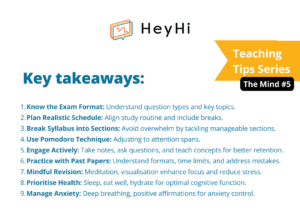Examinations can be daunting, whether you’re a student gearing up for a final exam or a professional pursuing a certification. The good news is that with the right mindset and strategies, you can set yourself up for success. In this article, we’ll explore six effective steps to prepare your learners’ minds for any examination. By following these steps, you’ll not only boost your confidence but also enhance your retention and application of the material.
Step 1 – Understand the Exam Format and Content
Before your learners dive into studying, take the time to thoroughly understand the examination format and content. Are there multiple-choice questions (MCQ), essays, or practical tasks? Knowing what to expect will help you tailor your preparation strategy accordingly. Familiarise themselves with the syllabus or study guide to identify key topics that will likely be covered.
Explore HeyHi Worksheet to prepare various assignments in any form from MCQ, fill in the blank (with options) to open ended questions with instant grading and progress tracking!
Step 2 – Create a Realistic Study Schedule
Time management is crucial when preparing for an examination. Craft a study schedule that aligns with your learners’ daily routine and commitments. Remember, consistency is key. Allocate specific time slots for each subject or topic, and include short breaks to maintain focus.
Break Down the Syllabus
Divide the syllabus into manageable sections. This approach prevents overwhelming feelings and allows learners to focus on one topic at a time. Treat each section as a mini-goal and celebrate their progress as they move forward.
Leverage the Pomodoro Technique
Consider using the Pomodoro Technique—study for 25 minutes, then take a 5-minute break. After completing four cycles, take a longer break. This technique enhances productivity and prevents burnout. That’s said, each learner has a slightly different attention span, thus, don’t push your learners too much to squeeze into the 25-minute framework. Instead, sympathise with their paces and initiate suitable studying-breaking ranges.
Step 3 – Active Learning and Engagement
Passive reading won’t cut it. Engage actively with the material by taking notes, asking questions, and teaching concepts to someone else. These activities reinforce your learners’ understanding and make the information stick.
Develop Flashcards
Creating flashcards is an excellent way to review key concepts. Write a question on one side and the answer on the other. Test your learners regularly or show them how to do it themselves to reinforce their memory.
Teach a Friend
Teaching a friend or family member about a topic forces your learners to explain concepts clearly. This not only benefits them but also solidifies your learners’ grasp on the subject. Read more about the “Protégé Effect” to unlock the full mental potential!
Step 4 – Practice with Past Exam Papers
Past examination papers are treasure troves of insight. They give out a sense of the question formats, time constraints, and difficulty level. Practice solving these papers under exam conditions to build confidence.
Review the mistakes your learners make while practising. Is there a pattern? Are there specific areas where they consistently stumble? Addressing these weak points can lead to significant improvements.
With HeyHi Analysis, learners’ progress will be captured down to the granular level in a matrix form. You are not only able to identify general learning gaps based on grading like in the conventional way but also easily navigate wrong answers in multiple worksheets throughout the entire learning period. Moreover, you can give your learners tailored worksheets to improve their shortcomings with just a few clicks!
Try out now: HeyHi for Teachers
Step 5 – Stay Healthy and Hydrated
Your learners’ physical well-being directly affects their cognitive function. Prioritise sleep, eat nutritious meals, and stay hydrated throughout the preparation period.
The Power of Sleep
During sleep, their brain consolidates information and forms connections. Tell them to aim for 7-9 hours of quality sleep each night to optimise their learning.
Brain-Boosting Foods
Incorporate brain-boosting foods like fatty fish, nuts, and blueberries into daily meals. These foods provide essential nutrients that support cognitive function.
Step 6 – Manage Exam Anxiety
It’s normal to feel anxious before an exam, but excessive anxiety can hinder your learners’ performance. Implement strategies to manage their nerves and stay focused.
Mindful Meditation
Allocate a few minutes daily for mindfulness meditation. Clearing your learners’ mind and focusing on the present moment can boost cognitive function and reduce stress.
Breathing Exercises
Practise deep breathing exercises to calm down. Inhale for a count of four, hold for four, exhale for four, and repeat. This technique triggers the relaxation response.
Positive Affirmations
Replace negative thoughts with positive affirmations. Remind themselves of their hard preparation efforts and past achievements to boost their self-confidence.
Shorten the exam-prep with HeyHi
With HeyHi, it’s a piece of cake!
Go paperless and convert your hardcopy MCQ material into a digital quiz with auto-marking and instant results if you have a ready-make list of questions. If you don’t, HeyHi provides you exclusive access to an extensive question bank of about 150,000 ready-to-use Singapore curriculum questions on top of yours.

